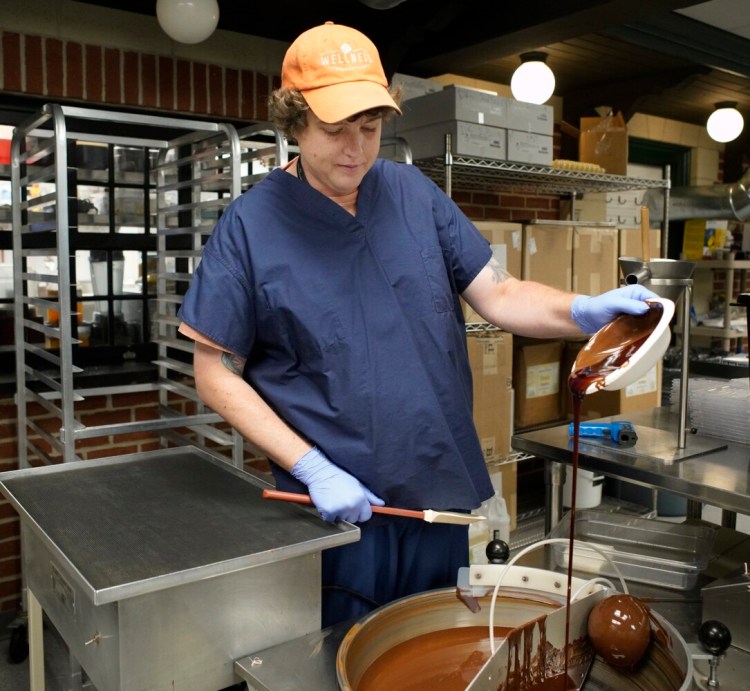Maine’s biggest marijuana company is suing its Rhode Island partner for breach of contract, blaming it for enormous losses in its popular edibles, tinctures and topicals line because of sloppy and outdated extraction methods and equipment.
In a lawsuit filed Tuesday in Cumberland County Superior Court, Wellness Connection of Maine claims CanWell LLC violated a 23-year deal inked in 2015 to provide it with the equipment and expertise needed to increase its extraction capacity. Wellness used CanWell’s equipment and training to extract concentrated THC, the pyschoactive agent in marijuana, from cannabis plants.

Craig Letowski, kitchen operations manager at Wellness Connection of Maine in Gardiner, adds THC extract to chocolate. Wellness filed a lawsuit Wednesday claiming a contractor it hired to provide extraction equipment and training was in breach of contract. Gregory Rec/Staff Photographer
“CanWell underperformed in many areas, but specifically, the operating procedures it laid out for us were flawed,” said Wellness lawyer Matt Warner. “The procedural flaws caused the equipment to consistently produce incredibly low yields and caused WCM to lose large quantities of valuable THC.”
Although CanWell promised extraction yields of 90 to 95 percent, Wellness claims CanWell designed and installed a “deeply flawed and inefficient” extraction operation that led to yields of 20 to 30 percent for the average batch of processed cannabis, according to the complaint filed Tuesday.
CanWell blames Wellness for the low yields. In a Rhode Island court last month, CanWell filed a demand for arbitration that blamed the extraction problems on inexperienced employees and high employee turnover in the lab and kitchen departments. The company said Thursday it had no comment on Wellness’ countersuit.
CanWell accused Wellness and its corporate parent, Acreage Holdings, of inventing an excuse to break their long-term contract, which included a non-compete clause that was preventing Acreage, a national marijuana giant, from expanding into Rhode Island and Massachusetts.
‘ENORMOUS LOSSES’
In its suit, Wellness never puts a number on its yield-related financial losses, referring to them as “enormous.” But in CanWell’s filing, it claims Wellness argued that it had lost about $14 million because yields were so far below what CanWell had promised.
In response, CanWell claims Wellness still owes it $650,000 in royalties on its extract products, which include edibles, capsules, tinctures, vaporizers and topicals – products used by medical marijuana patients seeking relief for a range of ailments. In the terms of the 2015 contract, Wellness was to give CanWell a 20 percent cut of sales of products made with extracts.
At the time, Wellness said it needed time to read the 51-page CanWell filing before replying. The countersuit makes Wellness’ response clear: CanWell is trying to hide its contractual failures behind a nonexistent turf war.
“The Rhode Island action filed by CanWell attempts to elevate this dispute to something much broader,” the filing read. “In reality, the facts of this dispute are quite simple: CanWell did not do what it had promised to do and, as a result, WCM has lost enormous sums of money.”
BATTLING FOR MARKET SHARE
The messy corporate split is giving the public a rare peek inside the state’s secretive cannabis industry. Wellness operates four of the state’s eight medical dispensaries, which as an industry saw sales fall 4.1 percent to $23.5 million last year.
Wellness plans to enter Maine’s adult-use cannabis market as soon as it launches next year.
The dispute also provides a jilted partner’s behind-the-scenes look at the complex, confidential deals that prop up the U.S. marijuana industry. The deals show the connections between even the small Maine scene and a few powerful companies that dominate the national market.
Wellness claims it began to question the efficiency of its extraction operation last summer. It started to measure its own THC yield and discovered it was low compared to industry standards. It asked for CanWell’s help, but claims that CanWell couldn’t explain the problem.
In its filing, Wellness claims CanWell was more interested in its Rhode Island work than it was in fixing Wellness’ yield problems. It claims it often had to beg CanWell to provide it with services, and that to get them, Wellness employees often had to travel to Rhode Island.
Wellness claims it eventually discovered CanWell had missed a step in the process – decarboxylation – that resulted in the low yields. Exposing the raw plant matter to low heat for an extended period of time helps to increase the THC concentration in the plant and makes extraction easier.
This discovery prompted Wellness to chat up vendors and even its competitors to learn more about decarboxylation. Their industry peers allegedly told Wellness that high-end extraction operations shouldn’t require this step because it is costly and inefficient.
When confronted, CanWell tried to fix the relationship, but “it was too little, too late,” Wellness claims.
In its suit, Wellness is seeking compensation for all of its losses caused by CanWell’s substandard equipment and processes, as well as the court’s permission to terminate its deal with CanWell for breach of contract, along with the non-compete provisions included in it.
Wellness has downplayed the connection to Acreage, a Canadian company with its U.S. headquarters in New York. It admits it is a major investor, but insists upon Wellness’ independence, especially during the recent debate over out-of-state investment in Maine’s emerging recreational market.
Acreage is a publicly traded Canadian company that got its start in Maine’s medical marijuana industry. Among its board members are political heavyweights such as former U.S. House Speaker John Boehner, former Massachusetts Gov. Bill Weld and former Canadian Prime Minister Brian Mulroney.
Acreage is one of the largest U.S. marijuana companies, with partnerships in 19 states. Earlier this year, Canopy Growth, an Ontario-based company that is thought to be the biggest cannabis company in the world, concluded a deal to buy Acreage for $3.4 billion.
Send questions/comments to the editors.




Comments are no longer available on this story